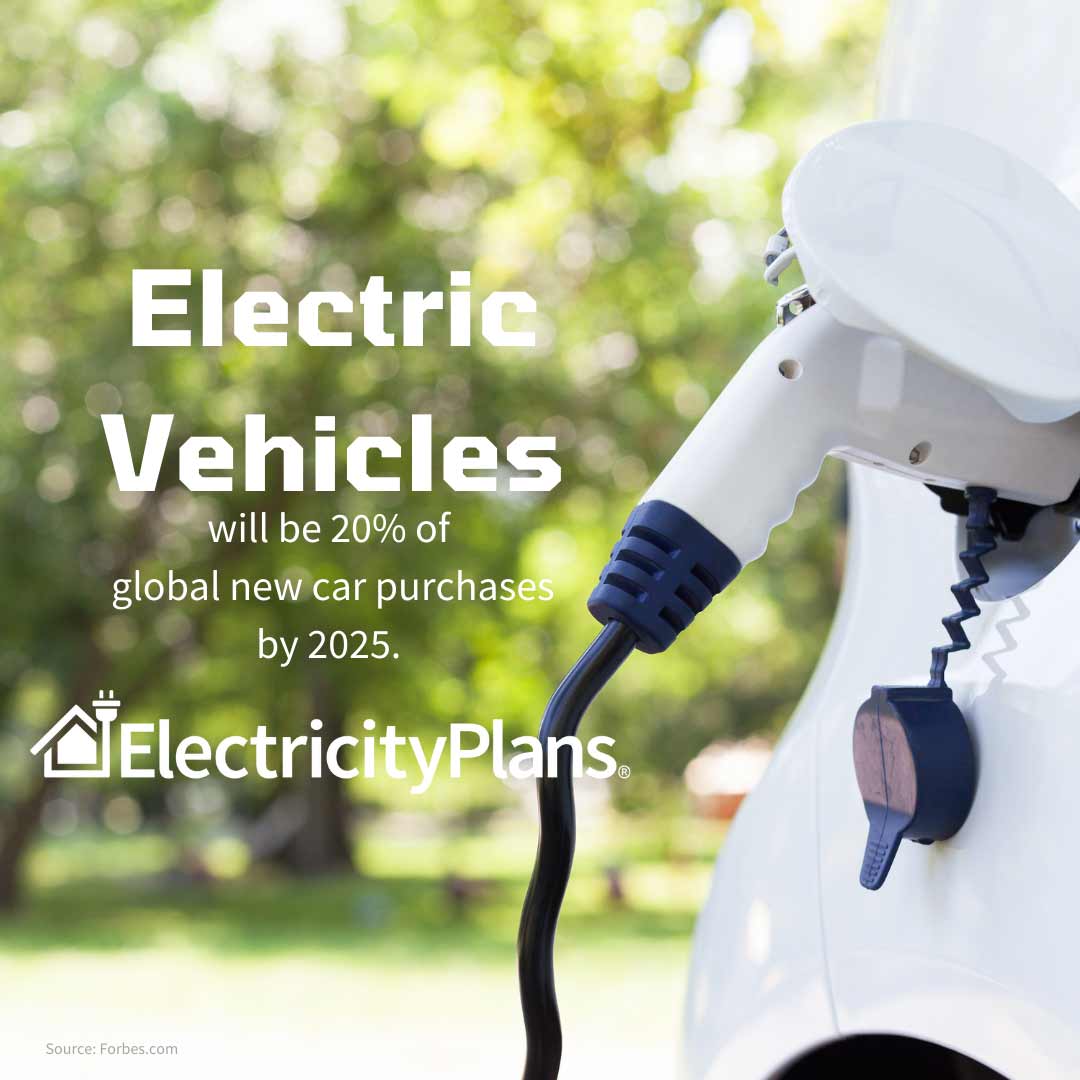Electric vehicles, or EVs, are an increasingly popular choice for vehicle purchases. But before you buy an electric car, you may want to look at how much it will cost to charge. After all, how much will an EV add to your electricity bill? Here’s how to calculate the costs of charging your EV at home.
How much does it cost to charge an electric car at home? Use your car’s battery storage kWh and multiply that by your price per kWh. That’s a good estimate of how much it costs every time you fully charge your EV. For example, a 40 kWh battery, charged with power that costs 11.4¢ per kWh (the Texas average rate), will cost $4.56 to fully charge. That’s 40 * $0.114.
How Much Does an EV Add to Your Electricity Bill?
About 80% of EV charging happens at home, according to Energy.gov. So how much does it cost to charge an electric car at home? Well, that depends on the type of charger you have and the type of vehicle.
Assuming:
- 40 kWh battery (the most common battery size for EVs)
- 30 amp level 2 charger delivering 7.2 kW
It will take around six hours to fully charge your car. That’s based on 40kWh divided by 7.2KW which is 5.55 hours. We rounded up to six hours because your charging efficiency slows down as the battery charges.
That 5.55 hours of charging time will use around 40 kWh. That’s the number of kilowatt hours based on the KW of the electrical item (in this case, 7.2 kW) multiplied by the number of hours (in this case, 5.55 hours).
So now we know how many kWh we’ll use to charge an EV. Now to calculate how much that will cost.
The Texas average electricity rate is 11.4 cents per kwh, according to EIA.gov. That means it will cost you around $4.56 to charge an EV at your Texas home. (40 kWh * .114)
(Psssst. You’ll notice that it’s the same answer we got in our quick math approach highlighted at the top of this page.)
How Much Will an Electric Car Add to Your Electric Bill?
To calculate how much an EV will add to your electric bill annually, let’s assume you get 200 miles per charge, and you drive 13,500 miles a year, which is the US average. That’s 68 charges per year. If you do 80% of your charging at home, you’ll charge your vehicle at home 54 times each year.
In Texas it will cost you around $246 annually to charge your EV. And that low cost is what makes electric vehicles popular in Texas.
Use our energy usage and cost calculator to find how much an electric car will add to your bill.
EV Charging Electricity Plans in Texas
Since EVs are so popular in Texas, and electricity is deregulated in most of the state? You can easily find special EV charging plans in Texas. You can find out about Texas EV charging electricity plans, plus read reviews of the best EV charging plan on our website.
Shop EV Charging Electricity Plans in Texas

Is Electricity for Electric Cars Free?
This is one of the big myths about buying an electric vehicle – that electricity for electric cars is free.
This idea may have come out of some of the earlier promotions that EV dealers ran. Some of them offered free electricity for your EV charging, through a network of charging stations.
Another reason people may think this? Most EV owners charge their car at night. In some electricity markets, such as Texas, there can be an excess of wind generation on the grid at night. Since electricity can’t be easily stored, it’s a use it or lose it issue. The excess supply at night is sold at very low prices. Wholesale electricity prices on the grid can even go negative if there’s a surplus of power.
But actually getting free electricity for your EV really depends on the type of electricity plan you are on.
If you are in a deregulated electricity market and your home has a smart meter, you can buy what’s called a “time of use” electricity plan. These include free night electricity plans, or a specific energy plan with discounted electricity during typical EV charging hours.
So if you buy a free nights electricity plan to charge your electric vehicle at night? Yes, the electricity for your EV is free. Just remember, you may still pay for the delivery fees that bring the electricity to your home. That’s one of the hidden costs of owning an EV.
Your best bet? Shop around to get the best price possible for your home electricity. Because that’s where you’ll most likely be charging your car.
>>Shop Best Electric Vehicle Charging Plans in Texas
How Much Does It Cost to Set-Up an At Home EV Charging Station?
You can easily charge your EV at home. There are 2 types of charging stations for at-home EV charging that are common in the US.
- Level 1 EV Charging Station: This approach uses your standard wiring. You’ll plug your car into a standard 110-120 volt socket using a 3-prong grounded plug.
- Level 2 EV Charging Station: Many EV owners invest in a level 2 charging station. This type of charging requires you to update your electrical supply to 240 volt, and install a special socket like the one your electric clothes dryer uses.
You’ll also need to purchase a charging station unit. HomeServe estimates that the all-in cost to install a level 2 charging station is $1200, including the charging station, installation and running new electrical. To confirm this, we chatted with some DIYers on Reddit. The costs ranged from $500 to $2000.
But there’s good news! There’s a federal tax credit for 30% of the cost of hardware and installation for your home EV charger, up to $1000. These incentives for a home EV charger can help offset some of your costs. Check with your tax advisor for more information.
How to Find a Free Public Charging Station for Your EV
You can save some money on charging your EV if you use free public charging stations. The price you’ll pay will be thr price of convenience. Because you’ll need to stay in that location for 20-30 minutes while your car charges.
The best way to find free EV charging near you is Plugshare, either online or via their app.
You can easily find free EV charging stations in your your area. You will need to register for this service. But Plugshare also includes a great trip planning tool if you’re taking your EV on the road.
Many new EV buyers can also get free charging credits from their dealership or manufacturer. For example, Nissan Leaf purchasers can participate in their “No Charge to Charge” promotion. You’ll receive a prepaid EZ-Charge card with access to all public chargers from providers such as ChargePoint, Blink Network, AeroVironment and NRG eVgo.
It pays to look for these special promotions so you can get free electricity for your EV.
The Benefits of EV Ownership
So outside charging an electric vehicle, what are the benefits of EV ownership?
- While sustainability first comes to mind, electric vehicles support the U.S. economy. Specifically, EV and hybrid vehicles are less dependent on traditional fuel sources and encourage other forms of energy generation — for example, the growing renewable market in Texas and other states.
- They’re designed to be more efficient through better fuel economy and features that require less energy than a standard combustion-powered vehicle: Today, EVs consume about 25 to 40 kWh of energy for every 100 miles driven. Batteries, too, can deliver power solely from electric charging.
- Although many balk at the upfront cost of purchasing an EV, expenses related to maintenance taper with time. You’ll also find that Clean Vehicle Tax Credits further keep down long-term costs.
- EV owners quickly find that their vehicles require less routine maintenance: These vehicles don’t need regular oil changes and don’t have ignition parts like spark plugs that need to be replaced after a certain number of miles. Overtime, EV owners spend roughly half as conventional gas-powered car owners do on routine maintenance costs.
- While infrastructure remains a concern, the ability to charge an EV at home supplements the growing number of public charging stations.
- As perhaps the most significant environmental benefit, EVs produce zero tailpipe emissions.
REFERENCES
https://rmi.org/electric-vehicle-charging-for-dummies/
https://chargehub.com/en/how-to-choose-home-charging-station.html
https://www.kbb.com/car-news/how-much-does-it-cost-to-charge-an-ev/
